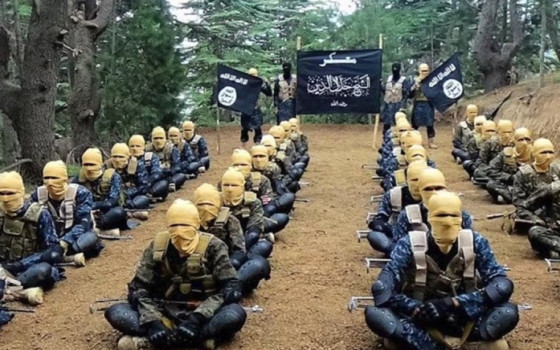
The Security Council is considering developing mechanisms to prevent international terrorist organizations from possessing weapons of mass destruction

- Europe and Arabs
- Monday , 2 October 2023 14:47 PM GMT
New York: Agencies
The International Committee concerned with combating weapons of mass destruction from reaching the hands of terrorist organizations in the world will hold consultative meetings starting tomorrow, Tuesday, at the United Nations headquarters to increase the effectiveness of its work mechanisms and develop the necessary mechanisms to force the governments of the world to cooperate to prevent weapons of mass destruction from reaching the hands of any organizations or organizations. Groups practicing terrorist activities in different regions of the world. According to what was published by the Middle East News Agency on Monday
This committee was known as the 1540 Committee. It emanates from the UN Security Council and reports directly to it. It was formed pursuant to a UN resolution issued in 2004, which prohibits any organizations that engage in subversive activities from seeking to possess weapons of mass destruction.
It holds the Member States of the United Nations responsible for showing the cooperation required to achieve this goal.
Ecuador - which currently holds the presidency of the committee - proposes a number of alternatives to strengthen monitoring, verification and information exchange procedures between countries of the world to prevent weapons of mass destruction from reaching the hands of any entities or groups that engage in subversive or violent activities, as well as those over whose activities specific governments have no control.
The United Nations Global Counter-Terrorism Strategy calls on Member States, international organizations and the United Nations system to combat the smuggling of chemical, biological, radiological and nuclear materials, and to ensure that advances in technology are not used for terrorist purposes while improving border and customs controls to prevent and detect illicit trafficking in weapons and chemical, biological and radiological materials. and nuclear weapons, and improve coordination in planning to respond to any terrorist attack using chemical, biological, radiological or nuclear weapons or materials.
According to experts, weapons of mass destruction vary between nuclear, radiological, chemical, biological, or any other type of weapon that can kill or cause serious harm to many people or cause serious damage to infrastructure or the environment.
The United Nations warns of the possibility that non-state actors, including terrorist groups and their supporters, may obtain and use weapons of mass destruction in a way that poses a serious threat to international peace and security. Over the years, terrorist groups have experimented with new ways and means to obtain more dangerous weapons and use them to increase harm. To the greatest extent and to incite terrorism, including weapons containing chemical, biological, radiological or nuclear materials.
In light of the progress the world is witnessing in technology and the expansion of legal and illegal commercial channels, including on the hidden Internet, obtaining some of these weapons has become increasingly possible for a number of international terrorist organizations that possess financial resources.
The Security Council specifically addressed the threat of the use of terrorism, weapons of mass destruction, and nuclear, biological, radiological and nuclear weapons on a number of occasions. In Resolution 1373 (2001), the Council recognized the link between international terrorism and, inter alia, the illegal transfer of chemical, biological and radiological materials. And the nuclear issue, the Security Council’s most influential declaration on this issue was in Resolution 1540 (of 2004), mentioned above, in which the Council affirmed that the proliferation of chemical, biological, radiological and nuclear weapons and their means of delivery constitutes a threat to international peace and security, and called on the Security Council again, in Resolution 2325 (of 2016), Member States to strengthen their national counter-proliferation systems in implementation of Resolution 1540 (of 2004).












No Comments Found